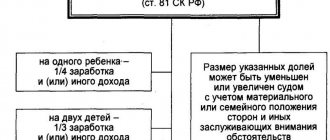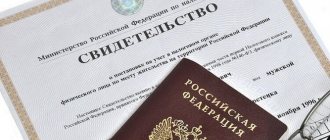A disabled person is a person who has a health impairment with a persistent disorder of body functions, caused by diseases, consequences of injuries or defects, leading to limitation of life activity and necessitating his social protection.
If a citizen decides to formalize guardianship of a disabled child, then he needs to study all the nuances of this topic.
Dear readers! To solve your problem right now, get a free consultation
— contact the duty lawyer in the online chat on the right or call: +7 Moscow and region.
+7 St. Petersburg and region. 8 Other regions of the Russian Federation You will not need to waste your time and nerves
- an experienced lawyer will take care of all your problems!
Who can become a guardian?
Requirements for guardians and trustees are established by law. Moreover, they are described in 3 regulations at once (Article 35 of the Civil Code of the Russian Federation, Article 146 of the Family Code of the Russian Federation, Article 10 of Law No. 48 of 2008 “On Guardianship”).
Basic conditions:
- Reaching the age of majority (18 years) and full legal capacity. A citizen cannot be recognized as emancipated by a judicial or administrative procedure. Reaching 18 years of age is a requirement.
- Having a regular income . Moreover, the amount of monthly income is not established. The citizen must provide information for 12 months. This could be information about pensions, salaries, remuneration, benefits.
- Availability of rights to living space . The law does not limit a person’s types of housing rights. This may be ownership, free use, or rent.
- Candidate's consent . The law does not provide for the possibility of establishing guardianship against the will of the guardian. The citizen must express consent in writing.
- Availability of parental rights . A person cannot be deprived of the rights of a parent or limited in them. Also, a candidate’s natural children cannot be taken away through his fault and adoption cannot be cancelled.
- No criminal record . A candidate cannot have an unexpunged or unexpunged conviction, or a conviction for a serious or especially serious crime.
- Lack of official marriage with a person of the same sex . Although registration of same-sex marriages is prohibited in the Russian Federation, according to the laws of other countries, the conclusion of such unions is possible. Representatives of such unions cannot obtain the right to family placement for any children, including disabled people. Since this is propaganda of same-sex love.
- Availability of the child's consent . If a disabled child can understand the consequences of his actions, then family placement for a minor over the age of 10 is possible only with his consent.
Can a disabled person be the guardian of a disabled child?
Expert opinion
Stanislav Evseev
Lawyer. Experience 12 years. Specialization: civil, family, inheritance law.
Citizens often wonder whether a disabled person can be a guardian. The law restricts the right to accept a minor child into a family only to disabled people of group 1. But it also stipulates a number of diseases that prohibit obtaining an opinion on the possibility of being a substitute parent. Moreover, it is not necessary to have a disability due to these diseases.
Government Decree No. 117 dated February 14, 2015 includes the following diseases in the list of diseases that prevent the receipt of a conclusion:
- tuberculosis;
- all types of cancer;
- alcoholism;
- drug addiction;
- substance abuse;
- infectious diseases.
However, the law provides for the right of a citizen to go to court to challenge the refusal of the guardianship department. If a child, at the time of registration of a family arrangement, lives with the applicant for a long time, then the court, in the interests of the child, may decide on the need to issue an opinion.
Example . Citizen X. filed a lawsuit to cancel the conclusion about the impossibility of being a candidate for guardian. The guardianship department indicated that the plaintiff had cancer as the basis for the refusal. At the time of going to court, the woman was undergoing chemotherapy. The girl lived with the candidate’s family for more than 3 years. The plaintiff's husband was her guardian. After his death, guardianship is automatically terminated. The girl had a disability due to cancer. The woman justified her demand by saying that a change of environment would be traumatic for the child. The court took into account the circumstances and satisfied her demands.
The law establishes additional requirements for guardians of a disabled child. For example, the guardianship department may require a separate room for the ward, the candidate has free time, and experience in caring for patients.
Social benefits
In addition to cash payments and benefits, the state provides guardians with benefits in the field of labor and taxation. In addition, separate benefits are provided for persons caring for disabled children.
Labor benefits
- Maternity leave is provided until the ward reaches 3 years of age (Article 13 of the Federal Law-81, Article 256 of the Labor Code of the Russian Federation);
- sick leave for a child under 7 years of age - for the entire period of illness, after 7 years - up to 15 days for each case of illness;
- the guardian has the right to part-time work or part-time work week (Article 93 of the Labor Code of the Russian Federation);
- do not work at night if there are children under 5 years of age (Article 96 of the Labor Code of the Russian Federation);
- the possibility of receiving 4 additional paid days off per month if the child under care has a disability (Article 262 of the Labor Code of the Russian Federation);
- annual paid leave, provided at his request and at a time convenient for him, if the ward has the status of a disabled person (Article 262.1 of the Labor Code of the Russian Federation);
- provision of part of the annual paid leave (at least 14 days) upon admission of the child under guardianship to a secondary or higher educational institution located outside the parent’s area of residence, to accompany him. If there are 2 or more children in a family, then leave is granted for each of them once (Article 322 of the Labor Code of the Russian Federation).
Download for viewing and printing:
Tax benefits
Citizens who have registered guardianship are provided with standard social and property tax deductions from the personal income tax base. The standard tax deduction is calculated if a minor is supported by the ward. This means that the 13% income tax is not levied on your salary.
Deductions for children are provided in the following amounts:
- 1,400 rub. - for the 1st and 2nd persons taken under guardianship;
- 3,000 rub. - on the 3rd and subsequent days;
- 6,000 rub. - for a disabled person under care.
The tax deduction is provided in double amount to the only guardian (clause 4, part 1, article 218 of the Tax Code of the Russian Federation). Social tax deduction is calculated for full-time education of wards (clause 2, part 1, article 219 of the Tax Code of the Russian Federation). Property tax deduction is calculated when purchasing housing or land plots for the construction of housing in the ownership of wards (Part 6 of Article 220 of the Tax Code of the Russian Federation).
Download for viewing and printing:
Benefits for caring for a disabled child
The following privileges are provided:
- provision of housing at state expense;
- the opportunity to receive a 50 percent discount on payment for housing and communal services and for the use of housing;
- the opportunity to obtain a plot of land for the construction of a house or subsidiary plot free of charge.
Attention! These benefits and allowances are enshrined in law and are mandatory throughout the Russian Federation.
How to obtain guardianship of a disabled child
Raising a disabled child is a complex process that requires a significant amount of resources. A large amount of money is required for proper care and education.
Although the law provides for free medical care, the provision of rehabilitation aids and monthly pension payments, in practice, expenses significantly exceed income. Therefore, parents do not always cope with the assigned responsibility for material maintenance.
There may be several reasons for obtaining guardianship over a disabled child:
- his parents abandoned him in the maternity hospital;
- mother and father do not fulfill their duties;
- parents earn money to meet the needs of the child and cannot personally care for him;
- the citizen has reached 18 years of age and is declared legally incompetent.
Important! Guardianship can only be assigned to a child under 14 years of age and to a person deprived of legal capacity by a court order.
with living parents
Raising a disabled child places a heavy burden on the shoulders of the mother and father. Not every parent is ready to take such a test. Therefore, they can abandon the baby immediately after birth, while still in the maternity hospital.
In addition, a situation is possible when parents cannot cope with upbringing in the process. Not everyone can provide specialized care.
If the guardianship department determines that the mother and father do not fully satisfy the needs of the minor, then they may be deprived or limited in parental rights. After the court decision enters into legal force, the child is transferred to the guardian’s family for upbringing.
First of all, specialists interview the relatives of the potential ward (grandparents, brothers, sisters). If no citizens are identified who are ready to accept him into the family, then the minor is transferred to be raised in the family of strangers.
In 2021, there has been a significant increase in cases of registration of family education for unrelated children with disabilities on the territory of the Russian Federation. During the year, several cases of guardianship of children with Down syndrome were recorded.
with the consent of mother and father
Maintaining and meeting the needs of a disabled child requires additional costs. Therefore, mom and dad must find additional ways to earn money.
Often this solution is to work on a rotational basis. However, a minor cannot be left without parental care.
Therefore, the law provides for the need to formalize guardianship at the request of the parents. The mother and father independently choose a guardian. As a rule, the grandmother becomes the child's representative caring for him.
The law provides for temporary guardians requirements similar to the conditions for a permanent placement. Therefore, the woman will also have to draw up a conclusion on the possibility of becoming a candidate and receive an order to appoint guardianship.
The guardianship department may refuse to register a grandmother as a substitute family for a disabled grandson if her moral character does not meet the requirements for a substitute parent. An additional condition will be the ability to provide proper care.
Thus, grandmothers who work night shifts, have a daily work schedule, or have been repeatedly brought to administrative responsibility cannot become guardians of disabled children.
after 18 years
Guardianship over an incompetent person and over a minor is formalized differently. Even if guardianship has been issued over the child, upon reaching the age of 14, its validity ends.
To re-register, you must go to court and declare the disabled person incompetent. The prosecutor's office, the guardianship department and close relatives have the right to go to court.
The issue will be resolved through special proceedings. During the process, a sanity examination is required.
If the requirements are satisfied, the court decision is given legal force within 30 days. After which the plaintiff has 30 days to obtain guardianship. Otherwise, the disabled person will be transferred to the care of a specialized organization.
A person who has lived with a disabled person for the last 10 years has preferential conditions for obtaining guardianship. He will need to provide a minimum package of documents, which includes a civil passport, information about income and information about the presence of family ties.
Rights and obligations
The list of rights and responsibilities vested in a guardian and trustee in relation to a child under his or her care, including a child with a disability, is contained in Art. 146 and, Article 15 of the Federal Law “On Guardianship...”
Responsibilities:
- Protect the rights of the ward;
- Represent the interests of the child in all state, municipal, and private organizations;
- Live with a disabled child under your care
- Promote recovery or maintain health (follow medical orders for treatment, exercise, medication);
- Support the child, create conditions for him in which his basic needs will be satisfied;
- Monitor the safety of property belonging to the ward, use his funds exclusively in his interests: for his maintenance, treatment, development, education.
Rights:
- Be the legal representative of the ward;
- Request for the assignment of benefits, benefits, payments, material assistance (vouchers, gifts, medicines) to the ward;
- Demand compensation or compensation for damage caused to the health or property of the ward;
- Receive assistance in fulfilling guardianship duties: legal, social, medical, psychological and pedagogical support;
- Receive remuneration for performing guardianship duties.
Not everyone knows that the law allows you to relieve yourself of guardianship duties if caring for a disabled child in your care has become a burden (Clause 3, Article 29 of the Federal Law “On Guardianship...”).
List of documents for a guardian of a disabled minor
The list of documentation varies depending on the age of the potential ward. Let's consider what data a candidate for guardianship of a disabled minor needs to prepare.
| No. | List of data |
| 1 | Passport |
| 2 | Certificate of income for 12 months |
| 3 | Medical report |
| 4 | Title document for housing |
| 5 | Statement from personal account confirming absence of debts |
| 6 | Written consent of all family members |
| 7 | Certificate of completion of training |
| 8 | Autobiography |
| 9 | Marriage document (if available) |
| 10 | Conclusion on the possibility of being a candidate for surrogate parents |
Registration procedure
The Law “On Guardianship and Trusteeship” clearly stipulates the procedure for establishing guardianship over a disabled child.
The state structure that makes the decision to appoint guardianship over a disabled minor is the guardianship and trusteeship authorities.
The list of papers that you should take with you is extensive and consists of:
- Documents confirming the availability of your own home;
- Certificates of earnings for the year preceding the application.
- Certificates of no criminal record, registration status in drug treatment and psychiatric dispensaries.
- Characteristics from the place of service.
- Certificates from health authorities confirming the absence of chronic serious diseases (oncology, tuberculosis, etc.)
If the guardian lives with other persons, their written consent will be required to accept the child into the family. Guardianship authorities have the right to request filling out an autobiography.
It is always welcome to take special courses - schools of adoptive parents, which are organized in every city and provide basic communication skills with adopted children and children under guardianship.
List of documents for a guardian of an incapacitated person
The list of information for the guardianship department varies for different categories of guardians.
| Title of the document | Close relatives | Strangers |
| Passport | + | + |
| Medical report | + | + |
| Certificate of income for 12 months | — | + |
| Marriage document (if available) | + | + |
| Consent of family members | — | + |
| Certificate of completion of specialized training | — | + |
| Document confirming the presence of a family relationship | + | — |
List of documents for a minor ward
To register guardianship, documents are provided not only by the candidate, but also by the potential ward. The list of documentation is prepared by the legal representative of the minor (guardianship department, parents, head of the orphanage).
Sample list:
- birth certificate;
- civil passport (if available);
- medical report;
- ITU certificate;
- individual rehabilitation program;
- information about the management of the mother's pregnancy and childbirth;
- medical insurance;
- SNILS;
- refusals from relatives;
- information about adult and minor relatives;
- information about parents (court decision on deprivation of rights, personal statement of mother and father);
- information about the child’s property;
- act of examining the life of a minor.
Payments, benefits and benefits
As a disabled person, the ward is entitled to a pension and benefits.
Child's pension
Children with social disabilities
the pension is paid through the Pension Fund, where papers should be submitted as soon as the status of “disabled child” is assigned. The pension will begin to arrive on the 1st of the next month. Every year from April 1, the size of social. pensions are indexed.
All children with disabilities until they reach adulthood receive approximately the same amount of pension; the difference is that in the regions the amount of payments is different, because directly depends on the minimum wage established in a given subject of the Russian Federation. The average amount of a child's disability pension after April 1, 2019 is 12,577 rubles.
USEFUL INFORMATION: From January 1, 2021, compensation may be introduced for children who do not receive a place in kindergarten
The guardian uses the disabled person's pension at his own discretion, but solely in the interests of the child. You should keep a book of expenses and save receipts for large purchases: this will be useful when checking and for drawing up an annual report on the expenses of the ward's pension - it is submitted as of February 1 of each year.
Monthly compensation
Guardianship, by default, is a gratuitous act, but if there is a disability, it is possible to provide paid services to the guardian.
Relatives, as a rule, take care of a disabled minor who is not a stranger to them without any compensation.
For several years now, the amount of monthly compensation to a guardian has been 5,500 rubles, but from mid-2021. The Russian government plans to increase the amount of payments to 10,000 rubles. To assign compensation, you must contact the POO with a corresponding application.
Compensation for expensive treatment
As Art. 219 of the Tax Code of the Russian Federation, the costs of expensive treatment will be compensated to the guardian as a tax deduction in full, but provided that the medical the institution is licensed, and the fact of treatment and costs is documented.
Benefits from biological parents
If the biological parents of a disabled minor are deprived of parental rights, then both the father and mother are required to pay alimony, the recipient of which will be the guardian. A guardian who takes on the care and upbringing of a child with special needs is entitled to the same benefits as his own mother and father - for example, labor benefits.
Benefits for guardians
If the guardian is unable to work due to the serious condition of the ward, then the period of care is counted towards the total length of service.
A working guardian has the right to receive 4 additional days off.
In the case of a disabled child of infancy, the guardian is entitled to maternity leave, as well as care leave until he reaches the age of 1.5 years. Tax benefits are also provided - for example, when the ward receives a higher education, etc.
Federal and regional payments
Federal payments include monthly compensation for non-working able-bodied caregivers, as well as a one-time benefit.
There are monthly reductions for utility bills.
Once a year, part of the expenses for the purchase of household items and furniture is reimbursed. Being a guardian of a child with a disability is a great responsibility and serious burden, in comparison with which all benefits and payments are scanty, however, the state is looking for opportunities to increase the amount of assistance to such people. Registration of guardianship is a simple procedure if all documents are collected and the identity of the candidate is not in doubt.
Documents ordered by the guardianship department
Not all data must be prepared by the potential candidate and the representative of the mentee. A number of information is prepared by a specialist from the guardianship department.
These include:
- To register the placement of a minor ward . Information about the candidate’s criminal record, an extract from the house register, information about the availability of a pension. Information about the amount of the pension is ordered for the child.
- When placing an incapacitated ward . Information about the candidate's criminal record, an extract from the house register, information about pension. In relation to the potential ward, information about the amount of the pension and an extract from the house register are additionally ordered.
Links to legislation
The process of accepting guardianship is regulated by many pieces of legislation. First of all, the registration rules and status of a person with a disability are regulated by the law “On Social Protection of Disabled Persons” and the Federal Law “On Guardianship”.
According to the accepted formulation, a disabled person is a person who has an incurable serious impairment associated with a disease or injury. Not only a physical illness can be the reason for establishing the status of a disabled person, but also a mental disorder or disorder.
If the disability is not associated with mental disorders, the process of selecting a guardian is decided with the direct participation of the disabled person himself. The provision on foster care is also given in the Civil Code (Article 41). According to Articles 28-29, mental disorders are exempt from the need to coordinate the candidate for guardianship with the person himself.
Download the article. 31-41 “Guardianship and Trusteeship” Civil Code of the Russian Federation (493.9 KiB, 884 hits)
The Civil Code provides clarifications:
- which citizens and in what order are taken under guardianship (Article 32);
- on the legal status of the parties to guardianship (Article 35);
- on concluding transactions on behalf of the ward (clause 2 of article 29).
Family law defines the specific concepts of this process, and also provides a list of requirements of the applicant for guardianship (Article 146)
When violations are detected, punishment procedures are determined by the provisions of the Code of Administrative Offenses of the Russian Federation.










